Thinking outside Tenangos: Alternative embroidery techniques from the Otomí-Tepehua-Nahua region in Hidalgo
Written by Arantza Caudillo
“What will happen when tenangos go out of style?” wondered Alejandra Ríos Perez, PSYDEH’s field coordinator. As people consistently indulge in overconsumption patterns to keep up with the latest fashion trends, it leaves PSYDEH’s team wondering: what will happen to the region’s economy when tenangos are no longer some of the trendiest pieces on the market? Many women from the Otomí-Tepehua-Nahua region of Hidalgo, Mexico rely on their beautiful tenango embroidery to support their families, sometimes as the sole household income.
In the last decade, tenangos faced a rapid increase in popularity. Many textiles were exported to the United States, Canada, France, Japan, the United Kingdom, Italy, and several other countries around the world. Tenangos even made an appearance in a popular US TV show “And Just Like That” in 2021!
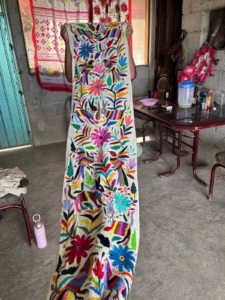 With overconsumption patterns and trends that change faster than the seasons, PSYDEH’s partners and personnel worry that the popularity of tenangos will eventually fade. Still, the question remains: what can we do as consumers and as organizations to continue to support artisans from the Otomi-Tepehua-Nahua region? I propose to start educating ourselves and others on the region’s ancestral knowledge of embroidery techniques to expand the types of traditional textiles in the market and curb overconsumption patterns by spreading awareness about the detailed craftsmanship and cultural significance of each textile that enters the market.
With overconsumption patterns and trends that change faster than the seasons, PSYDEH’s partners and personnel worry that the popularity of tenangos will eventually fade. Still, the question remains: what can we do as consumers and as organizations to continue to support artisans from the Otomi-Tepehua-Nahua region? I propose to start educating ourselves and others on the region’s ancestral knowledge of embroidery techniques to expand the types of traditional textiles in the market and curb overconsumption patterns by spreading awareness about the detailed craftsmanship and cultural significance of each textile that enters the market.
The astonishing mountain range in the southeast of Hidalgo is home to three Indigenous ethnic groups: the Otomíes or Ñuhus, Tepehuas, and Nahuas. While most of those who belong to any of these groups adopted the more commercially successful “tenango” embroidery technique, many have vast knowledge of other culturally significant embroidery techniques that preceded the tenangos. These techniques include the punto de cruz otomi from the municipalities of Tenango de Doria and San Bartolo Tutotepec, pepenado tepehua from Huehuetla, and punto de cruz and telar de cintura nahua from Acaxochitlán. Thus, this article aims to delve into the history and cultural significance of each embroidery technique to inspire readers and consumers to explore handcrafts of the region beyond the tenangos and contribute to increased awareness around more sustainable, slow fashion.
From cave paintings to single mothers: The birth of tenangos
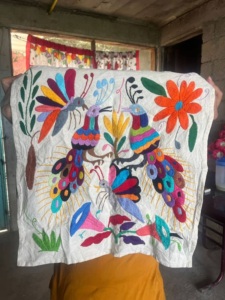 “This is the story las doñitas [diminutive for older women in Spanish] tell buyers,” explained Jaz, field corps leader for PSYDEH, after discussing one of the most famous stories about the birth of the tenangos. Jaz recounts that in the face of foreigners and potential buyers, many artisans share the same story about tenangos. The story follows a woman from the community of San Nicolas, belonging to the municipality of Tenango de Doria, who found inspiration in prehistoric cave paintings in “El Cirio,” and she began drawing those paintings onto raw canvas fabric, converting a new embroidery design into a culturally significant technique representing the Otomí cosmovision found in those paintings.
“This is the story las doñitas [diminutive for older women in Spanish] tell buyers,” explained Jaz, field corps leader for PSYDEH, after discussing one of the most famous stories about the birth of the tenangos. Jaz recounts that in the face of foreigners and potential buyers, many artisans share the same story about tenangos. The story follows a woman from the community of San Nicolas, belonging to the municipality of Tenango de Doria, who found inspiration in prehistoric cave paintings in “El Cirio,” and she began drawing those paintings onto raw canvas fabric, converting a new embroidery design into a culturally significant technique representing the Otomí cosmovision found in those paintings.
Tenangos emerged as an economic alternative for the region, and many ignored its true roots for decades (Vazquez y de los Santos 2015, 165). When asked about the meaning of the tenangos, many artisans will reply that the drawings are merely animals and plants they see “en el cerro” [on the hill] (Vazques y los Santos 2015, 163). However, the Otomí cosmovision lives deeply within each thread of the Tenangos. Over time, and with the support of Mexican academics, women from the communities of San Pablo and San Nicolas progressively gathered their memories to uncover the true origin of the tenangos.
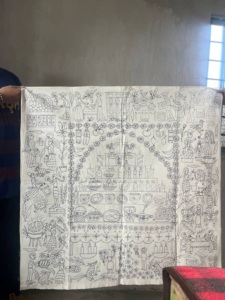 The first ever tenango drawers were male curanderos [healers] during the 1960s who possessed ancestral knowledge to treat physical, emotional, and spiritual ailments (Vazques y los Santos 2015, 164). The curanderos used their knowledge of deities and plants to depict them in their drawings of tenangos, which the women would later embroider (Vazques y los Santos 2015, 164). Eventually, women also learned how to draw, and the activity became more feminized. While many forgot the curanderos’ role in making tenangos, women from the region have taken on excavating their own past to recover the true Otomí cosmovision behind tenangos.
The first ever tenango drawers were male curanderos [healers] during the 1960s who possessed ancestral knowledge to treat physical, emotional, and spiritual ailments (Vazques y los Santos 2015, 164). The curanderos used their knowledge of deities and plants to depict them in their drawings of tenangos, which the women would later embroider (Vazques y los Santos 2015, 164). Eventually, women also learned how to draw, and the activity became more feminized. While many forgot the curanderos’ role in making tenangos, women from the region have taken on excavating their own past to recover the true Otomí cosmovision behind tenangos.
Tenangos, as we know them today, emerged in a wider market in the 1960s as an alternative income for women whose family income did not cover the cost of living, for women who did not finish their education, for single mothers who could not leave their household, and for women seeking agency in a patriarchal economy. While these reasons dictate why tenangos exist, each stitch, thread, color, and drawing represents the Otomí cosmovision on both individual and communal levels.
What was before tenangos? Punto de cruz otomí from Tenango de Doria and San Bartolo Tutotepec
The Ñuhu people are the largest ethnic group in the Sierra Otomí-Tepehua-Nahua region with 20,113 self-ascribing as Ñuhu in 2020! Out of that number, 4,364 live in the municipality of Tenango de Doria, 5,037 in the municipality of San Bartolo Tutotepec, and 9,056 in Huehuetla (Martinez Patricio and Castillo Oropeza 2024, 9). If the tenangos emerged during the 1960s, what did the Otomí artisans do before them?
Embroidery and textile production represents an integral aspect of Otomí cosmovision, as these practices embodied the essence of the goddess Xochiquetzal. She not only represents love and sexual pleasure but also art. Many believed she protected artisans, especially those who embroidered (Vergara Hernandez 2023, 5). Thus, religious connections to embroidery show how this practice has endured within the Otomí people for centuries.
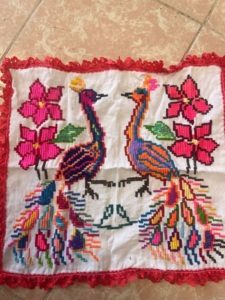 If you walk the streets of San Bartolo Tutotepec or happen to have the pleasure of being invited into an Otomí household, you will not miss the beautiful household items, specifically cloth napkins embroidered in punto de cruz. This stitch consists of sewing small X shapes following a previously drawn figure until the embroidery takes the desired look. Many Ñuhu women, especially older women, know how to embroider punto de cruz and usually own household items embroidered in this stitch. However, many of these items are purely for personal consumption and rarely reach the market.
If you walk the streets of San Bartolo Tutotepec or happen to have the pleasure of being invited into an Otomí household, you will not miss the beautiful household items, specifically cloth napkins embroidered in punto de cruz. This stitch consists of sewing small X shapes following a previously drawn figure until the embroidery takes the desired look. Many Ñuhu women, especially older women, know how to embroider punto de cruz and usually own household items embroidered in this stitch. However, many of these items are purely for personal consumption and rarely reach the market.
When asked why they abstain from selling these beautiful pieces, women often reply that they do not sell well compared to tenangos. Academics and consumers overlooked a significant practice of Ñuhu culture, as most focus on tenangos or other practices of the region and fail to produce academic research on punto de cruz. However, punto de cruz is just as integral and culturally relevant as any other technique.
While we lack academic information, many other Otomíes from other regions across Mexico have similar ancestral embroidery techniques that show the complexity and cultural importance of the stitch punto de cruz.
The Forgotten Embroidery: Pepenado and Telar de Cintura Tepehua from the municipality of Huehuetla
The Tepehuas make up a minority group in the southeast mountainous region of Hidalgo, concentrating the majority of their population in the municipal head of Huehuetla and in bordering communities (Martinez Patricio and Castillo Oropeza, 9). In a 2020 population census by the National Institute of Statistics and Geography (INEGI, for its acronym in Spanish), only 1,656 people self-described as Tepehua.
The pepenado and telar de cintura are central in Tepehua textile art. These types of embroidery techniques are found in shirts, skirts, corsets, and in poncho-shaped pieces called kexkemes, tapun, or quexquemitl made from two rectangular cloths sewn together to form a diamond shape with a central hole for the head. The embroidery in each of the pieces represents elements of Indigenous identity through the portrayal of Tepehua cosmovision regarding life and death and their relationship with the universe, stars, and nature (Flores Aparicio 2014, 127).
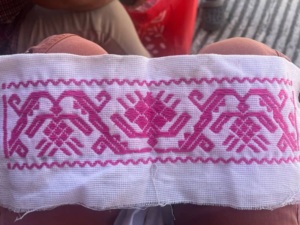 As demonstrated by Doña Juanita, artisan and treasurer of the cooperative Tierra de Bordadoras, the pepenado embroidery technique involves creating small, closely spaced stitches that form intricate patterns, often resembling dots or tiny loops. Pepenado typically requires fabric that allows the artisan to count each thread to make symmetrical stitches. The artisans place the embroidery on the shoulders, chest, and back of the shirt, as well as at the bottom of the skirt.
As demonstrated by Doña Juanita, artisan and treasurer of the cooperative Tierra de Bordadoras, the pepenado embroidery technique involves creating small, closely spaced stitches that form intricate patterns, often resembling dots or tiny loops. Pepenado typically requires fabric that allows the artisan to count each thread to make symmetrical stitches. The artisans place the embroidery on the shoulders, chest, and back of the shirt, as well as at the bottom of the skirt.
The motifs behind each pepenado include flowers, birds, mammals, and geometric figures. The design in the shirt’s sleeves represents the cycle of life and death and must be in the colors red, representing fertility; green, representing nature; or blue, representing life (Flores Aparicio 2014, 128). The pepenado embroidery represents the creativity of Tepehua women and shares their ancestral knowledge about human nature.
Moreover, Tepehua women elaborate the quexquemitl, commonly known as tapun in Huehuetla, with telar de cintura. The telar de cintura is a traditional weaving tool that tightens around the waist, and the other end ties to a tree. The action of weaving consists of perpendicularly intertwining two groups of threads–called urdimbre–in a parallel position along the fabric, which later interlock with crosswise threads called trama (Flores Aparicio 2014, 120). The tapun can be used as a cover over the head, a veil or shawl on the head, over the shoulders, or in a triangular shape over the chest and back.
The Tepehuas carried their cosmovisions, traditions, and knowledge in every piece they wore and every thread they embroidered and woven. The pepenado in shirts, skirts, and corsets and the telar de cintura in the tapun demonstrate the complexity of ancestral wisdom that continues to endure in today’s Tepehuan culture.
Telar de Cintura and Punto de Cruz in Acaxochitlán
Acaxochitlán, a municipality closer to the more urban Tulancingo, Hidalgo, is complete with stunning greenery, delicious gastronomy, and beautiful handicrafts embodying the people’s strong cultural roots. Unlike the Tepehuas, the Nahua people from Acaxochitlán have received national and international recognition for their intricate embroidered pieces, most importantly their quechquémitl– commonly spelled differently than in Huehuetla– and purses in telar de cintura and punto de cruz. However, these pieces have faced a similar fate as the Tepehua tapun, as they also experienced a limited market and clientele.
The municipality of Acaxochitlán borders with the state of Puebla and is one of the furthest out municipalities from the region yet much more accessible for urban trade. The Nahua people are the largest ethnic group in Acaxochitlan as 21,798 Nahua people reside in this municipality (INPI 2020). The communities of Santa Catarina and Santa Ana Tzacuala have notably received the most attention regarding their embroidered handicrafts.
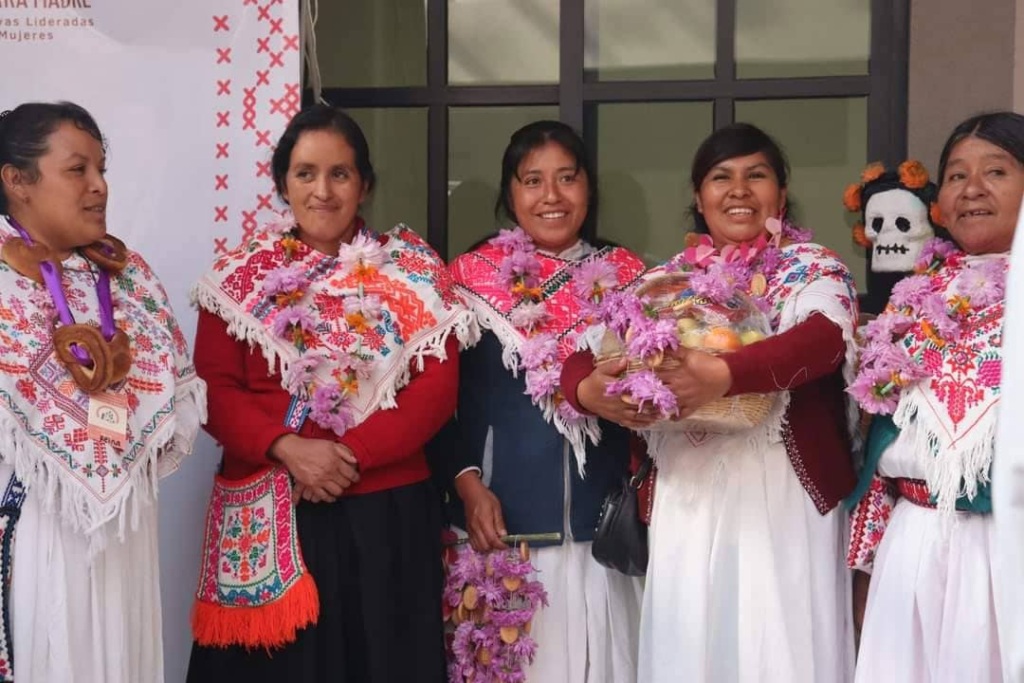 Similarly to the Tepehua, the Nahua use the telar de cintura, a traditional weaving tool that consists of intertwining threads called urdimbre and trama, to elaborate the quechquémitl. Moreover, they also use colorful threads and punto de cruz stitch to embroider these pieces and inscribe their cosmovisions and ancestral knowledge. For instance, the floral tree in most of their quechquémitl aligns with their cosmological symbolisms (Báez Cubero 2020). Nahua artisans usually embroider flowers, animals, borders, and geometric figures on their quechquémitl in diverse colorways (Báez Cubero 2020). Nahua artisans did not limit themselves to quechquémitl and also embroidered napkins, bags, and folders using the same technique to sell them in local markets.
Similarly to the Tepehua, the Nahua use the telar de cintura, a traditional weaving tool that consists of intertwining threads called urdimbre and trama, to elaborate the quechquémitl. Moreover, they also use colorful threads and punto de cruz stitch to embroider these pieces and inscribe their cosmovisions and ancestral knowledge. For instance, the floral tree in most of their quechquémitl aligns with their cosmological symbolisms (Báez Cubero 2020). Nahua artisans usually embroider flowers, animals, borders, and geometric figures on their quechquémitl in diverse colorways (Báez Cubero 2020). Nahua artisans did not limit themselves to quechquémitl and also embroidered napkins, bags, and folders using the same technique to sell them in local markets.
The elaboration and use of quechquémitl using telar de cintura and punto de cruz represents Nahua ancestral knowledge that dates back to the prehispanic period. The quechquémitl carries a legacy of Nahua cosmovisions and culture, remaining an integral factor in preserving Indigenous traditions in the Otomi-Tepehua-Nahua region.
Conclusion
Curbing the narrative of fast fashion and design trends will allow us to discover alternative and sustainable pieces made to last a lifetime that also contribute to the development of the local economy. Sharing and purchasing pieces embroidered in tenango, punto de cruz, pepenado, and telar de cintura from the people of the Otomí-Tepehua-Nahua region will not only contribute to the well-being of artisans and their cooperatives, as well as the sustainable development of local communities, but also the conservation of important and long-standing cultures and traditions. Moreover, it is a small but impactful step towards a more holistic consumer market that values craftsmanship, artisans, and preserving cultural traditions, rather than a reckless, wasteful, and trend-saturated market.
As readers and consumers, I invite you to check out each of PSYDEH’s women-led artisan cooperatives–Cooperativa Tierra de Bordadoras,Yu Danxu Mpfei Di Töi, Ya Bombé Uedi Ko Nä Müi, and Cooperativa Sihuame Tekikame– to dive deeper into the Otomi-Tepehua-Nahua region handicrafts and support local artisans. I also invite you to browse the newly launched e-commerce platform “Sierra Madre Network” to explore and shop seasonal textiles from the aforementioned women-led cooperatives!
Cited sources
Vazquez y de los Santos, Elena. 2015. “El Arte Popular de las Mujeres de Tenango” in Mujeres, Feminismo y Arte Popular by Eli Bartra and Maria Guadalupe Huacuz Elias. Mexico: Universidad Autonoma Metropolitana
Martinez Patricio, Gustavo and Oscar Adan Castillo Oropeza. 2024. Ontologías ecopolíticas en la Sierra Oriental Hidalguense (México): una mirada sobre la ritualidad de los Ñuhu y Ma’alh’ama’ a la Sirena. Mexico: Revista Kawsaypacha.
Flores Aparicio, Palemon Alberto. 2014. Tepehuas de Huehuetla: Costumbres y Tradiciones. Hidalgo: Pacmyc.
Báez Cubero, Lourdes. 2020. Quechquémitl de Acaxochitlán. Museo Nacional de Antropología. https://mna.inah.gob.mx/detalle_pieza_mes.php?id=232
Instituto Nacional de los Pueblos Indígenas (INPI). 2020. Atlas de los pueblos indígenas de México. https://atlas.inpi.gob.mx/nahuas-de-hidalgo-estadisticas/
Vergara Hernandez, Arturo. 2023. “Los ÑHAÑHU u Otomí del Estado de Hidalgo, una Visión a Vuelo de Pájaro.” México: Universidad Autónoma del Estado de Hidalgo.
Women’s Leadership School, New Initiatives & June Elections in Mexico!
The end of June marks six incredibly busy, productive, and impactful months here at PSYDEH and we’re here and eager to share all about it!
NEW WEBSITE & NEW IMPACT REPORT
First things first, we’ve officially launched our new website and our 2023 annual impact report this month! Check them out and let us know what you think. We’re always looking for meaningful ways to promote our organizational values of creative impact and transparency and to share our rural, Indigenous community-led development work with the world, and we’re very proud of all the efforts of our team and Global Collaborator volunteers for making this great work happen. Plus, be on the lookout for our Sierra Madre cooperative network’s official e-commerce platform launching on our site before the end of summer. We’ll let you know exactly when 😉

TEAM RETREAT & VIRTUAL WORKSHOPS
Since we last connected with you in February, we hosted a lively and enriching team retreat in our offices in Tenango de Doria (essentially a productive 3-day sleepover) to start unpacking 2024 and our 5-year strategic plan. Programming-wise, we celebrated our first fully virtual workshop series on Indigenous women’s rights with our cooperative network thanks in part to our transformative partnerships with Viasat, Team4Tech, and the Honnold Foundation.
On the ground, our team helped cooperative members log in from their homes and PSYDEH’s digital resource centers to engage in the workshop together as a mighty cohort of 60 rural and Indigenous women across the Sierra Otomí-Tepehua-Nahua. We were incredibly moved by the workshop series and also by the power of technology to bring us all together to learn, share, debate, and grow.
Hosting our workshops virtually also meant that our team was able to avoid the standard 3-4-5-6 hour commutes that can be required to deliver in-person workshops in the rural communities where we work. This is a reality we couldn’t have dreamed of years ago and is a radical demonstration of the impact of our Tech For All program.

TOURISM PILOT: RUTA RED SIERRA MADRE
Is there anything more special than sharing, learning, enjoying new experiences, meeting new people, and seeing the world in new ways? These tenants are fundamental to PSYDEH’s regenerative tourism pilot project that officially launched this spring in collaboration with Lynda Martinez del Campo at Understand Mexico.
In April, our team welcomed and led fourteen guests from Mexico City to Acaxochitlán, a major milestone of women’s leadership and empowerment for our team and our cooperative network. More details on the next phase of this project coming soon!
INTERNET UPGRADES
“The most humanistic part of activism is the efforts in rural communities. Today the Narciso Mendoza Bilingual Primary School in Piedra Ancha has satellite Internet!” – Salma Sinaí Soto Montes, PSYDEH Field Team Leader, San Bartolo Tutotepec
With support from our transformative partner Viasat and their dedicated team, we were able to install internet systems and ensure the advancement of digital inclusion and connectivity at PSYDEH’s new digital resource centers in the isolated communities of Piedra Ancha, San Pablo el Grande, Santa Inés, and San Esteban. Truly a major physical and logistical feat! These new digital resource centers will also support women partners, local schools, groups, and communities to access free internet, communicate more easily with family and friends, advance community development and entrepreneurial projects, access important digital tools and resources, and join PSYDEH’s virtual workshop series.
“We finished the work on April 30 (Children’s Day in Mexico), an important “gift” for our women partners, who, to tell the truth, looked like little girls they were so excited!” – Alejandra Ríos Perez, PSYDEH Field Team Coordinator

ELECTION SEASON
In June, Mexico had one of the largest electoral processes in its history. In addition to electing a president for the next six years, deputies, senators, governors, and municipal presidents were also elected throughout the country.
A few months before the election, we were thrilled to receive news that our latest civic engagement initiative, Nosotras Decidimos [We Decide], received funding from the Support Fund for Electoral Observation (FAOE 2024). In a nutshell, Nosotras Decidimos focuses on empowering rural women with the information they need to make informed decisions and actively participate as citizens and local leaders in the electoral process and beyond the duration of the elections as they learn to advocate and construct proposals for elected administrations in favor of their demands as members of local cooperatives.
Following the facilitation of an official INE (National Election Institute) training, 32 members of the PSYDEH network served as election observers in 4 rural municipalities in the state of Hidalgo on Sunday, June 2. We shot an entire documentary on it. More on that soon! A historic day in many ways (shout out to our first women president!) – this process also served as a strong example of the power of civic education in action. Beyond a vote, our team and women partners learned and exercised their rights and are all active models of female leadership in their communities.
From here, PSYDEH will continue leading our Nosotras Decidimos workshop series inspiring new levels of civic participation throughout the rest of 2024 and ensuring that a women-drafted Citizen Agenda is prepared by the fall to present and activate locally as new municipal government officials begin to take office.
Congratulations to all of our women partners for their commitment to democratic processes, citizen empowerment, and women’s leadership in this year’s elections and beyond.
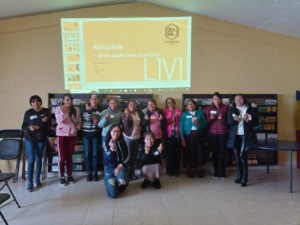
LOOKING FORWARD
Wrapping our ninth workshop of the year this week, focused on plant medicine and self-care, PSYDEH’s team and women partners look ahead to many big opportunities and challenges in the months to come. First, we’re eager to continue developing our organization’s replicable model plan, wherein we bring our work, values, and programming to new communities in Hidalgo and beyond. More on that soon! We’re also coordinating exciting new, and partnerships (shout-out to COLPOS, Onora, PACMYC, Cemefi, Viasat, and more!) while advancing steadily in this year’s Sierra Madre Network Leadership School, Tech For All programming, and other ambitious initiatives. Never a dull moment!
We truly appreciate your steadfast support as our team and our women partners continue to grow and our systems change work advancing social, economic, and gender equality continues to blossom and fruit across Hidalgo. The processoooo continues.
We’ll be in touch with more updates in the coming months (prepare yourselves for that cooperative e-commerce store announcement!) but, until then, we wish you and your communities a beautiful and enriching summertime.
Saludos y abrazos,
Team PSYDEH
Early 2024 Wins and Updates from PSYDEH
Early 2024 Wins and Updates from PSYDEH
Written by Katie Freund
PSYDEH is off to a running start in 2024! In addition to beginning the third year of our Sierra Madre Network and Tech for All programs, the first months of the new year have been full of one-of-a-kind events and exciting news for PSYDEH and our partners.
Events
To kick off the year, 8 members of the PSYDEH team traveled to Cancun, Mexico, to represent our organization after being selected as the nonprofit partner for Brandi Carlile’s Girls Just Wanna Weekend Festival. This was an incredible opportunity for PSYDEH team members and our partner cooperatives to share our work with hundreds of festival attendees, and also represented our largest fundraising event to date: through the festival, Looking Out Foundation raised over $43,000 of flexible funding for PSYDEH, and we sold an additional $7,000 in artisan goods from women partners’ cooperatives.
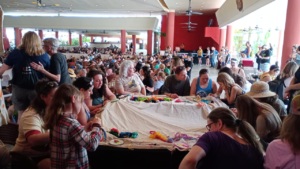
In addition, PSYDEH was featured as a nonprofit partner at the first-ever edition of Mirada Corta, a new short film festival that took place in Mexico City. PSYDEH cooperatives created hand-embroidered tote bags for the event, and the first chapter of our 6-part impact series was featured before a sold-out audience.
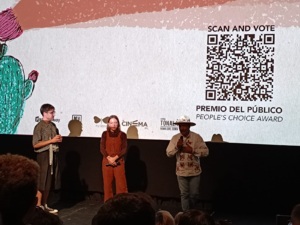
Partnerships
At the end of January, valued long-term partner Viasat received news that our collaborative digital inclusion programming was selected for a prestigious Anthem Award, a testament to our ongoing impact-making work towards expanding tech access, use and innovation in rural Mexico. The Anthem Awards celebrate purpose and mission-driven work by companies, individuals, and organizations around the world. Viasat and their LATAM partners—including PSYDEH—received Bronze recognition in the Diversity, Equity & Inclusion Category for Education or Literacy Program or Platform.
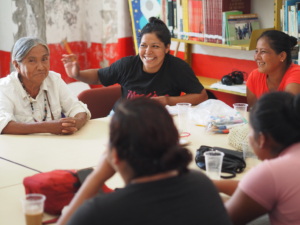
In addition, we are about to begin an exciting design-challenge collaboration with employees at Nintendo, focused on expanding market opportunities for the Sierra Madre Cooperative Network. Facilitated through program partner Team4Tech, a dedicated Nintendo volunteer team will spend 3 days designing new ways to improve cooperative business sales at the national and international level.
In the Field: 2024 Leadership School and Beyond
2024 program work marks the start of the 3rd year of both of our flagship programs: the Sierra Madre Network and Tech for All, with a focus on increased business opportunities for women partner cooperatives, innovation in digital skills and tools, and leadership at the community and regional level. Curriculum work will focus on individualized personal and professional skill development as well as community impact projects.

February saw the implementation of our first-ever fully virtual workshop as well as the development of several other initiatives: Acaxochitlan’s cooperative continues work on an award-funded documentary about the recovery and preservation of a local weaving tradition, multiple cooperatives continue a collaboration with Mexico City-based luxury design company Onora, and the Network begins the development of community impact projects targeting local issues through a new initiative, Sierra Solidaria.
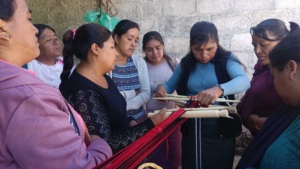
In the Heart of Empowerment: Jorge Echeverria
In this interview, we delve into the remarkable journey of our General Coordinator Jorge Echeverría, the visionary leader steering the mission of PSYDEH. With a background in psychology and a profound commitment to human rights, Jorge’s story is one of resilience and empowerment. Jorge’s experiences have shaped his unwavering dedication to community organization. Join us as we uncover the inspiring narrative of Jorge Echeverría’s impactful work with PSYDEH.

How did PSYDEH came to be?
After living in Hidalgo for seven years, getting to know different local and national organizations, I had the opportunity to participate in a Diploma on Professionalization of Civil Society Organizations endorsed by the MORA Institute and the INDESOL Institute of Social Development.
My interest in human rights advocacy marked the need to develop promotion and defense actions in the most vulnerable communities of Valle de Tulancingo. This is where we started working as a collective of four women and myself, engaging in human rights issues.
From this experience, PSYDEH was born as a Civil Society Organization.
What is your age, and what is your current role within PSYDEH?
I am 58 years old; I am a professional psychologist. Currently, I work full-time as the General Coordinator of PSYDEH, but in previous years, I have been able to combine my time at PSYDEH with other activities such as:
- Teaching for the Social Sciences department at the Autonomous University of the State of Hidalgo for the High School section in the Tulancingo region, Hidalgo.
- Coordinating Social Development Projects with United Nations Organizations in Guatemala and Civil Society Organizations in Mexico.
In each of the projects executed, I have had to coordinate technical teams of professionals, teams from local organizations, technicians from government agencies, and representatives from civil society both in Guatemala and in Mexico.
I’ve consulted for both national and international organizations, overseeing the monitoring and evaluation of projects initiated by non-governmental and development entities.
I have been a consultant and trainer on topics such as Citizen Participation, Democracy and Governance, Strategic Planning, Citizenship Building, Human Rights, Risk Management, Project Development and Management, Building Masculinity, and Leadership.
I’ve conducted experiential workshops on these subjects, employing the Popular Education methodology. This approach utilizes participatory techniques, empowering participants across diverse groups, including children, youth, adults, farmers, and indigenous communities.
- Alternate Counselor of the Citizen Advisory Council of the Law for the Promotion of Activities of Civil Society 2013 – 2016.
- Representative Counselor of Civil Organization of the Advisory Council of the National Commission for the Development of Indigenous Peoples, CDI 2015 – 2018.

What motivated you to establish PSYDEH?
Since 1976, my life has had great moments; at the age of 11 in my country Guatemala, we had an earthquake of 6.5 magnitude. At that time, many houses were made of adobe and tile roofs. The majority of these houses did not withstand the earthquake, causing extensive material damage and loss of life. My family and many others had to improvise with plastic sheets and makeshift shelters to live, and this went on for more than 60 days. I remember that despite the lack of electricity, water, and food, people began to organize and develop collective support programs where the entire community felt safe and could ensure their daily sustenance.
It was incredible to witness the community’s resilience, providing essential services and organizing activities for the youth. Guatemala’s history is marked by over four decades of internal conflicts, military rule, and frequent coups, leading to a loss of individual rights for its citizens.
In 1988, I entered university to study a degree in Psychology.
In 1992, I joined a United Nations program to develop a Mental Health project in one of the areas most affected by the internal conflict; where the Guatemalan army burned and destroyed hundreds of communities. The survivors took refuge in the mountains and at the border with Mexico. Here, once again, I realized the importance of organization. Groups of farmers began to organize into small collectives and little by little returned to their original communities, where they had to start rebuilding their houses from scratch.
These two experiences made me realize that organizations play an extremely important role in people’s lives. For these reasons, I see that the work of PSYDEH, focused on community organization, is the key to development from the bottom up.
 What have you learned during your time with PSYDEH?
What have you learned during your time with PSYDEH?
PSYDEH has strengthened me as a human being. With PSYDEH, I have had the opportunity to work with a large family of collaborators, volunteers from more than 10 countries, wonderful people who have given and continue to give their best in PSYDEH’s programs.
PSYDEH has allowed me to get to know a team of professional women motivated to learn and share their knowledge with their communities. Being part of this training process where I can offer my experiences, but more importantly, where we can all build together and be participants in community development is invaluable.
PSYDEH has allowed me to confirm that the people who live in the rural communities of Hidalgo, despite facing great challenges in achieving well-being standards, are motivated to participate in processes of community organization that strengthen and empower them, generating skills to be the main actors in their community development, creating a bottom-up process in harmony with their environment.
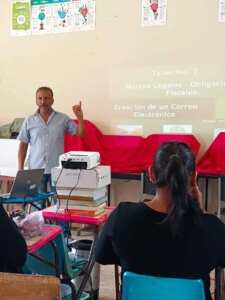
If you were to recommend that someone volunteer or get involved with PSYDEH, why would that be?
PSYDEH is a safe space for the exchange of learning;
– On a professional level, they will find a multidisciplinary and multicultural team,
– They’ll experience diverse climates, from cool woodlands at 3°C to tropical jungles at 35-40°C, amidst stunning landscapes.
– Culturally, they will be able to interact with three indigenous groups (Otomí – Tepehua – Nahuatl) with ancient customs and worldviews.
In the last 5 years, PSYDEH has had volunteers who have been amazed by their stay in the Otomí-Tepehua region.
Jorge Echeverría’s dedication to empowering communities through PSYDEH is nothing short of inspirational. His journey, marked by a deep-rooted commitment to human rights and a profound understanding of the transformative power of community organization, serves as a beacon of hope for vulnerable populations in Hidalgo. We are proud to serve alongside him and the communities, and consider ourselves very fortunate to have had the opportunity to work with him. Jorge Echeverría’s story is a testament to the resilience of the human spirit and the profound impact one can have in building a brighter future for communities in need.
Accessible Technology Advancing Sustainable Development
Recognizing the potential of accessible technology to foster sustainable development, PSYDEH explores tools like Google Lens to promote new opportunities and address local inequalities with rural and Indigenous women and their communities.
Accessible technology as a human right
Technology is pivotal to empowering communities, globally and across Mexico, by fostering sustainable development through education, economic opportunities, and civic engagement, thereby also protecting human rights. Despite the recognition of internet access as a fundamental human right by the UN, nearly 3 billion people worldwide lack internet connectivity (UN, 2021). In Mexico, approximately 20 million people lack broadband coverage and 98% of internet users rely on smartphones (US DOC). This glaring inequality emphasizes an urgent need for communities throughout Mexico to keep pace with technological advancements and fundamental human rights.
UNESCO has identified that illiteracy most often impacts older adults, individuals with disabilities, agricultural workers, Indigenous people, and women. Among the 773 million people worldwide who cannot read or write, 61% are women. (UNESCO, 2018). These disparities are evident in rural, underdeveloped areas, such as eastern Hidalgo in central Mexico, where rural women and their communities also face unequal access to technology.
 Combining digital inclusion and economic solidarity
Combining digital inclusion and economic solidarity
In early 2022, PSYDEH launched Tech For All (“Tec Para Todos”) alongside the Sierra Madre Network (“Red Sierra Madre”) program to foster local community-driven development and address the social, economic, and gender equality gaps further exacerbated by the COVID-19 pandemic. Through the establishment of Tech For All, PSYDEH initiated a three-phase process over three years focused on 1) local IT infrastructure, 2) digital literacy training, and 3) tech tools for social innovation. Over the course of 2022, and with vital support from Viasat Inc., Clear Blue Technologies, and the Honnold Foundation, PSYDEH established six remote digital resource centers with satellite internet, solar energy solutions, and new information and communications technology.
Bridging worlds with Google Lens
As outlined in PSYDEH’s Tech For All program, proficiency in technology is becoming as vital as reading and writing skills. In rural contexts with low education levels, our team has discovered that Google Lens, a powerful image recognition tool launched in 2017, holds great potential for bridging both a literacy and digital literacy gap.
With its ability to identify objects, translate text, solve math problems, and provide relevant information based solely on photos, Google Lens offers revolutionary accessibility features, eliminating the need for users to read or write. Thanks to an initial exploration into the tool with PSYDEH staff and Viasat volunteers in November 2022, it was determined that Google Lens should be incorporated into the 2023 programming curriculum with PSYDEH’s women partners.
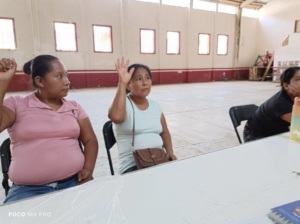 In April 2023, I helped to lead PSYDEH’s first Google Lens workshops designed for four cooperatives based in the remote mountainous region of the Sierra Otomí-Tepehua-Nahua of Hidalgo. The workshop is based loosely on a curriculum and learnings from Viasat partners (see this promo video for more on our collaboration).
In April 2023, I helped to lead PSYDEH’s first Google Lens workshops designed for four cooperatives based in the remote mountainous region of the Sierra Otomí-Tepehua-Nahua of Hidalgo. The workshop is based loosely on a curriculum and learnings from Viasat partners (see this promo video for more on our collaboration).
On the morning of Tuesday, April 19, our first Google Lens workshop was held in the municipality of Huehuetla, deep in the Sierra Madre mountains, nearly six hours northeast of Mexico City, with the women-led cooperative La Fuerza Otomi-Tepehua. Many of the cooperative members shared that they had never used Google before, and certainly had never heard of Google Lens. There were several who gave a thumbs down in terms of their digital literacy during our initial diagnostic. When asked their thoughts on whether technology and accessibility were important they expressed similar views; everyone deserves equality, but not everyone gets equal treatment.
Each generation had different interests and viewpoints when it came to technology. The younger crowd, under 40 years old, wanted to know how Google Lens could help their cooperatives sell their handmade textiles and other artisan products. Elders of the group were more interested in how they could read or send a text message. After a few hours of practice translating texts, identifying embroidery patterns, and having Google Lens read words captured from a piece of paper, the women seemed excited about this new tool.
The evaluation towards the end of the workshop was overwhelmingly positive. A majority of the women reported that they felt relatively comfortable using Google Lens and were able to expand on how they could use this tool in their everyday lives. “The most important part,” shared Alejandra Ríos Perez, PSYDEH’s Field Program Coordinator, “is that they are interested!”
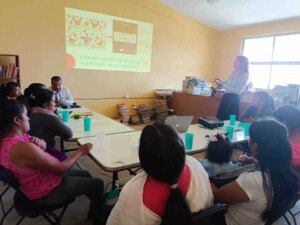 The next day, the second workshop was held in Santa Catarina, a remote town in the municipality of Acaxochitlán. Santa Catarina is only reachable by an unpaved road. Here, the team faced the most barriers with our Google Lens workshop. With no wifi, the cooperative members, a majority who speak Nahua as their first language, needed to purchase extra data in order to fully take part in the workshop. Despite these barriers, participants seemed to be attentive and curious about these new accessibility tools. Many of the younger cooperatives members took a strong interest in Google Lens, seeing it as a tool to help better price the cooperative’s products, help with their children’s homework, and “show off to my husband” joked, Reina Cruz Rojas, president of the Sihuame Tekikame cooperative. Many PSYDEH team members commented how tricky workshops introducing new technology are to this cooperative. But if it was possible in Santa Catarina, they said, the chances of tech tools like Google Lens taking off in other remote parts of Hidalgo and, potentially, across Mexico were high.
The next day, the second workshop was held in Santa Catarina, a remote town in the municipality of Acaxochitlán. Santa Catarina is only reachable by an unpaved road. Here, the team faced the most barriers with our Google Lens workshop. With no wifi, the cooperative members, a majority who speak Nahua as their first language, needed to purchase extra data in order to fully take part in the workshop. Despite these barriers, participants seemed to be attentive and curious about these new accessibility tools. Many of the younger cooperatives members took a strong interest in Google Lens, seeing it as a tool to help better price the cooperative’s products, help with their children’s homework, and “show off to my husband” joked, Reina Cruz Rojas, president of the Sihuame Tekikame cooperative. Many PSYDEH team members commented how tricky workshops introducing new technology are to this cooperative. But if it was possible in Santa Catarina, they said, the chances of tech tools like Google Lens taking off in other remote parts of Hidalgo and, potentially, across Mexico were high.
If Santa Catarina was the most remote location, Tenango de Doria was the most accessible. The cooperative Tierra de Bordadoras led by PSYDEH Field Corps Leader Jazmín (Jaz) Manrique Vigueras, had the best access to the internet in the region, plus several cooperative members equipped with the latest smartphone models. After practicing with Google Lens features including the translation and reading aloud tool, cooperative members were excited by the thought of sending their kids text messages and not having to memorize their grocery lists at the market. There were a handful of older members who had limited Spanish and needed Otomí translations from Jaz, but even so, they were able to understand the Google Lens voiceover in Spanish.
The final Google Lens workshop of the week took place in San Bartolo Tutotepec, a two hour drive from Tenango, and one of the most marginalized municipalities in Mexico. We were met with curiosity and nerves. The leader of the cooperative Yu Danxu Mpefi Di Toi was nervous at first to share the little experience she had with Google, but by the end of the workshop she was taking photos of library books and translating them into English with ease. Roughly 80% of women who rated their technology abilities with a thumbs down at the beginning of the workshop rated themselves with a thumbs up or so-so by the end. We finished by asking them to use Google Lens to solve daily challenges like sending messages to family members, reading doctor notes, and translating signs as an assignment before their next workshop to be held two weeks later.
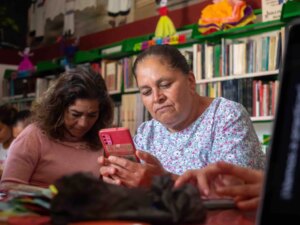
The realities of sustainable development – it’s not all roses
When we assisted cooperative members, especially the younger participants attempting to assist elder participants, we noted that some women lacked enthusiasm. A handful of older members felt overwhelmed by the new technology, questioning its usefulness without access to wifi or data. They have a point. Workshops on digital literacy, especially in remote areas and among older Indigenous generations, can highlight the potential these tools hold for both present and future community members without demanding everyone adopt the same tools. As beautifully articulated by the International Institute for Sustainable Development, sustainable development can “meet the needs of the present without compromising the ability of future generations to meet their own needs.” Guided by this principle, PSYDEH’s programs strive to empower women-led cooperatives with technology compatible with local, cultural, and economic conditions and then allow women to make informed and autonomous decisions around personal and collective adoption of these tools.
Similar hesitancy toward new technology emerged from community members outside the cooperative workshops. Conversations with an older man in Tenango de Doria shed light on concerns about Google Lens and external influences on local Indigenous culture, including my own presence. This discussion prompted dynamic conversations within PSYDEH: What influence do our workshops have on the communities we serve? Far too often, top-down development models neglect the opinions of those they aim to “serve.” In the complexities that must be addressed during the design process of sustainable development programs (education, income, gender, abilities, etc.), the answer is an unbelievably simple one: ask the community what they need. Never make assumptions. Check-in at every stage of the process. Understand what is and is not relevant. See how tools are being integrated. Listen and process feedback.
By prioritizing community needs, we move away from imposition and embrace open-mindedness and curiosity. By engaging in the design process, communities actively shape programming, promote innovation, and foster human rights.
Aligned with PSYDEH’s process-oriented, community-driven development model, our Google Lens workshop series was designed to address gaps in both literacy and digital literacy as shared by community members in the municipalities where we work. In turn, these workshops empowered women through new information, tools, and exchanges so that they could actively assess the value and relevance of these technological tools for future use.
Closing gaps and exploring the future
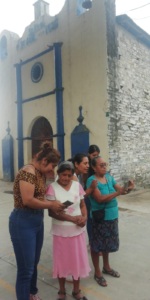 The “right to connection” is more than having internet access; it includes the ability to connect with new communities and resources, empowering women to lead their own education and build independent networks. Marginalized communities can also represent themselves and tell their own stories using technology. Communities can gather their own data and implement responses to local social, economic, and gender inequalities. While it is understood that technology can exacerbate social issues, it can also strengthen solutions. For example, in the case of gender-based violence, women with access to technology are likely to have more tools and resources to help break patterns of violence.
The “right to connection” is more than having internet access; it includes the ability to connect with new communities and resources, empowering women to lead their own education and build independent networks. Marginalized communities can also represent themselves and tell their own stories using technology. Communities can gather their own data and implement responses to local social, economic, and gender inequalities. While it is understood that technology can exacerbate social issues, it can also strengthen solutions. For example, in the case of gender-based violence, women with access to technology are likely to have more tools and resources to help break patterns of violence.
Following the workshops, cooperative members have already reported using Google Lens to read doctor’s prescriptions aloud when visiting the pharmacy and comparing pricing with other artisan cooperatives across Mexico. Although barriers persist in these remote communities, the areas that PSYDEH serve are gradually integrating into new national and global digital landscapes thanks in part to accessible technology like Google Lens. With new tools, a dedicated team, and a growing network of women partners, PSYDEH’s work addressing severe gaps in social, economic, and gender inequality in rural Mexico looks much more promising than even a few years ago. In a relatively short time, PSYDEH’s Sierra Madre network of cooperatives is both learning and using accessible technology to increasingly champion their own needs and rights.
Author: Alex Lane
USA Development Associate, PSYDEH
2022 Year in Review
 In 2022, we took a giant leap forward in our work to make a sustainable impact in the fight against inequality in rural Mexico.
In 2022, we took a giant leap forward in our work to make a sustainable impact in the fight against inequality in rural Mexico.
This success is thanks to a lot of hard work at the local level as well as unique partnerships with global partners.
It is also a reflection of PSYDEH’s intentional evolution as a paradigm changer for other grassroots nonprofits and in the community-led development field.
We will do a deep dive into what this evolution looks like in our forthcoming 2022 annual report (just like these). For now, enjoy this snapshot of impact and growth highlights, including our new impact video series narrated by some of the powerful women leading PSYDEH.
PROGRAM IMPACT:
BY THE NUMBERS
PSYDEH made all kinds of noteworthy impacts through field programming linking economic solidarity and digital inclusion strategies.
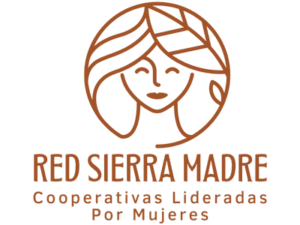 ECONOMIC SOLIDARITY
ECONOMIC SOLIDARITY
With our flagship program Red Sierra Madre (RSM), we successfully launched a social and economic impact-generating network for local women facing extreme marginalization in the communities where they live. RSM is built on learning from 2021 programming, which itself was built on what we did with women since reorienting how we work in 2014.
What does this mean? Pursuant to local demands by our majority-Indigenous women partners, and to meet six of the goals in the UN’s 2030 Agenda for Sustainable Development, PSYDEH launched a three-year cooperative incubator program that is core to our replicable model for community-led development built for Mexico and the Global South.
In year one (2022), this had us delivering a 9-month cooperative school built on a 52-hour curriculum integrating learning from Mexican non-profit Incuba and global corporation 3M. By year-end, we had delivered hundreds of hours of training and 224 hours of coaching for 135 majority-Indigenous women. Moreover, 58 program graduates formed 4 women-led cooperatives – La fuerza otomí-tepueha, Tierra de Bordadoras, Yu danxu mpefí di töí, Sihuame Tekikame – representing a region of 90,000 people living in some of Mexico’s most marginalized areas.
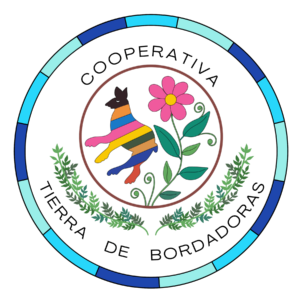
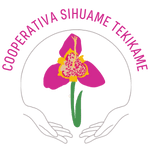


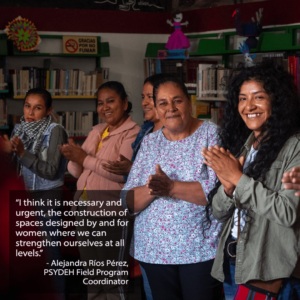
These cooperatives used funding from the USA non-profit networking organization WARP and PSYDEH to produce 4 community impact projects. Cooperative members created their own social media pages with a segmented communication strategy. They also co-led a regional public forum linking 175+ women artisans and national and international partners, in part with the aim to produce this powerful human rights-based DECLARATION produced with technology from our Adobe partnership. This proclamation is a collection of local women’s demands of their government for the human rights-oriented policies that they believe will best foster sustainable development of their communities.
In 2023, PSYDEH’s cooperative network builds on 2022 success by recruiting more women to their ranks while graduating from a second year of entrepreneurship training focused primarily on personal and business development. This informal business school-like educational experience consists of another 9-month program facilitated by PSYDEH’s team and our new Puentes skills-sharing volunteer program and learning from global partners including 3M and Johnson & Johnson. Moreover, the 60+ women leaders of these cooperatives will work with PSYDEH to pursue the funding they need to launch a second iteration of our social enterprise initiative called Bordamos Juntos, including exploring how to use a voice-amplifying website created with Zoom company in 2021. Cooperative leaders will also be supported in producing a second round of 4 local community impact projects and another edition of our regional forum series linking their economic solidarity efforts to a revised rights-based declaration to be presented to local, state, and federal government officials.
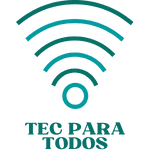 DIGITAL INCLUSION
DIGITAL INCLUSION
With Tec para Todos, we transformed how PSYDEH and the women and community partners we serve ACCESS and USE information and communications technology (ICT) to INNOVATE solutions to local problems.
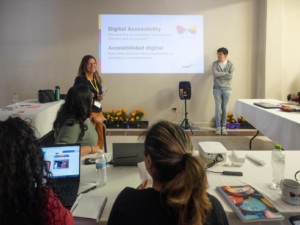
Pursuant to local demands, PSYDEH launched a multi-year digital inclusion effort with 6 regional tech empowerment centers equipped with satellite internet thanks to our Viasat and Team4Tech partnerships. Two of these hubs are outfitted with solar kits from Clear Blue Technologies, giving over 350 majority women and girls in 4 municipalities consistent access to ICT.
PSYDEH’s field office “Casa Siempre Viva” and the field team are outfitted with tech tools and have been trained on how to use them to educate women partner-beneficiaries and their neighbors. For example, we deploy the first tranche of laptops (PCs and Macs) donated by Viasat while expanding access to cloud tools like Google Workspace, Slack, AdobeExpress, and Canva. We also equipped our field team with rural digital literacy toolkits including cell phones, remote battery packs, portable speakers, and personal defense equipment.
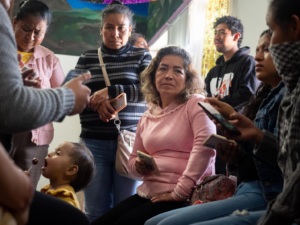
In 2023, PSYDEH increases ACCESS to tech through the more seamless use of Viasat satellite wireless at our 6 hubs and additional purchases of hardware and software we need to do our work. We use Honnold Foundation support to strengthen solar solutions to energy challenges. With stabilized access, we make further investments in tech USE and INNOVATION when launching a laptop loan program as well as a “basic and advanced” digital skills program integrated intentionally into Red Sierra Madre (RSM) programming with learning from Viasat and Zoom. Target students are PSYDEH’s team and the 60+ cooperative members of the RSM network. We will also have a particular focus on how to use cell phones and cloud tools like Adobe Express to achieve strategic goals. Lastly, with additional support from a growing ecosystem of tech company partners and local governments, we expect to strengthen our tech loan program and build out an “introductory” digital skills program for the communities in which we work.


RSM & TPT PROGRAM IMPACT:
TESTIMONIALS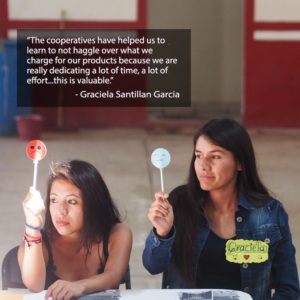
Our programming helps to put women like Graciela, the acting president of the cooperative La fuerza otomí-tepehua, in the driver’s seat to help her and her collective to sell their sustainably made, ethical goods in different selling markets. This will put money in women’s pockets and bolster local economic development in their rural areas. As Graciela shares,
“In the future, I see that if we continue to work together and stay united, we will obtain good results. Little by little the work we are doing in the cooperative is going to generate and will generate and produce more.”
The impact is not only focused on improving economic and social equality. Women accessing and using digital tools to bring economic benefits to their families and communities increase their equality among men and government officials. PSYDEH volunteer Geovany Sabanilla Gonzalez, says,
“It’s beautiful to know that people at an international level believe in your work, that they believe in the women of the cooperatives. Personally, it has been a very rewarding experience. Cooperative members are seeing how technology has helped us to learn, communicate better, solve problems in our daily lives, and improve the quality of our textiles. And now women partners know that their textiles can be marketed at a fair price and that there are people out there who are interested in knowing about them and their daily lives, who respect their reality and recognize that they are admirable, strong, and committed women— something that the community sometimes does not see.”
 When reflecting on 2022 work, a PSYDEH staff member says that “I think this is an important point for me…. to make an impact within our communities, prudent impact without impositions, that’s what we are doing.” Another staff member shares how she “is thrilled to see women graduating, believing in cooperative work and inspiring other women, to think that perhaps it was the persistence and workshops that made them believe that makes me proud.”
When reflecting on 2022 work, a PSYDEH staff member says that “I think this is an important point for me…. to make an impact within our communities, prudent impact without impositions, that’s what we are doing.” Another staff member shares how she “is thrilled to see women graduating, believing in cooperative work and inspiring other women, to think that perhaps it was the persistence and workshops that made them believe that makes me proud.”
One more beneficiary story.
Yu danxu mpefí di töí produces and sells silk flowers at public markets throughout their municipality to generate income for themselves and their families. Using funds from recent sales, cooperative members decided to invest in new flower molds purchased online for the first time. PSYDEH’s field leader Salma Sinai Soto Montes shares that cooperative members wanted to confirm the delivery date for their order and ensure they’d be available to receive the shipment but had no experience doing so.
Using new tech and training, coordinating their order and shipment was possible and these women partners were empowered to invest in themselves, their cooperatives, and their revenue-generating potential. As Salma says, “Cooperative members commented that they had never followed a link to track a package before, and, in fact, they had never ordered anything on the internet before. This experience was new for them, and I could see that it gave them more confidence to learn and understand shipments and online sales. This will benefit their cooperatives in the future.”

ORGANIZATIONAL GROWTH
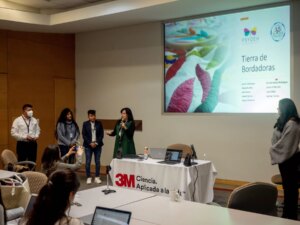
While many grassroots Mexican nonprofits are closing their doors because of a lack of resources in 2022, PSYDEH expanded operations thanks to another year of robust office success driven by our development team.
PSYDEH raised 38 times more resources than we did in 2014. This is extraordinary. And 85% of these resources are in-kind, goods and services from the global partnerships described below, our Global Collaborators Program, and contributors like Google, Slack, and Canva. Our goal is to build on 2022 success by maintaining non-monetary resource levels while increasing flexible funding in 2023. This will be possible thanks in part to continued support from our long-standing partner, the USA-based crowdfunding platform GlobalGiving, and their professional development BRIDGE program with Lightful.
We continued multi-year partnerships with PopSockets, Zoom, and Lemonaid & ChariTea and formed 4 new ones with Adobe, 3M, Honnold Foundation, and Viasat. Thanks to these alliances, we were profiled in Fast Company and Diginomica as well as an Australian public radio program. We also benefited from 1750 volunteer hours donated by Viasat, Adobe, and 3M partners in Mexico, the USA, and Europe valued at $367,500 USD.
In 2022, PSYDEH received funding to attend our first global conference in the USA while continuing our years-long tradition of hosting in-country experiences with groups of professionals from the private sector and academia. For example, we were chosen by 3M as one of only five Mexican nonprofits to work with the 3M Impact Mexico program facilitated by USA-based Pyxera Global. Here, our field team engaged four Mexico 3M professionals in the field and in Mexico City to produce a replicable business plan that Red Sierra Madre network cooperatives can use to sell their handicrafts such as embroidery, textiles, and woodwork to local, national, and global markets.

PSYDEH culminated a year-long, multi-pronged transformative partnership with Viasat Inc by engaging 16 of their USA and European professionals in a 10-day immersive professional services experience produced by our joint partner Team4Tech. This incredible initiative is PSYDEH’s biggest corporate pro bono professional services project ever.
PSYDEH was also chosen as one of only a handful of nonprofits around the world to be an early adopter of Adobe company’s new cloud-based design tool Adobe Express for nonprofits. By year-end, we were awarded a VIP invite to attend their Adobe MAX conference in Los Angeles, California, USA, while being profiled in print, and in promotional and instructional videos. PSYDEH also received flexible funding, and organizational licenses to use their industry-leading Creative Cloud design tools in our ongoing impact storytelling efforts.
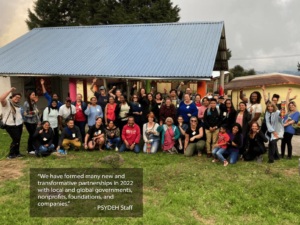
Wrapping up 2022, PSYDEH partnered with Brazil-based Campus b to host 26 doctoral students from The Chicago School of Professional Psychology in December. Our goal was to facilitate cross-cultural exchange between the students and PSYDEH staff and Red Sierra Madre cooperative leaders, including putting in place what we need to help address the more personal challenges women face in rural Mexico family systems. This immersive fieldwork came out of an earlier successful virtual experience with The Chicago School in the 1st quarter of 2022
2022 IMPACT VIDEO SERIES
Towards Holistic Program Impact Measurement In Rural Mexico
The need for nuance in evaluating the impact of long-term, education-centric development programs such as PSYDEH’s
Impact measurement, evaluation, and reporting are vital yet complex and time-consuming components of any non-profit organization’s (NPO) work. Funders rightly ask organizations to demonstrate positive impact in order to justify continued support; yet, this puts pressure on NPOs to present themselves as favorably as possible, potentially obfuscating or even overstating their impact.
Providing donors with a return on investment is important to us. Still, this does not make our impact reporting any less challenging. Given the very nature of our work, which focuses on long-term, paradigm-shifting, human-centric change, measuring progress is far more complex than simply cataloging outcome metrics in our donor reports. This article illustrates several of these complexities we face when implementing our programs in dynamic, rural environments. It also highlights why – in spite of our challenges – our work remains much needed in the communities we partner with.
________________________________________________________________________________________________________
 The days are long and the work is hard for the PSYDEH field team members engaging our partner communities in rural Hidalgo, central Mexico. Six months into PSYDEH’s 3-year human-rights-oriented, Sierra Madre Network program, the field team continues its daily work using digital tools to organize four cooperatives, with the aim of empowering women entrepreneurs to lead local projects and market their artisanal goods at a fair and dignified price. To achieve this, our team organizes biweekly capacity-building workshops for cooperative members, visits isolated communities to recruit new participants, and meets weekly to reflect on progress and chart the next steps forward.
The days are long and the work is hard for the PSYDEH field team members engaging our partner communities in rural Hidalgo, central Mexico. Six months into PSYDEH’s 3-year human-rights-oriented, Sierra Madre Network program, the field team continues its daily work using digital tools to organize four cooperatives, with the aim of empowering women entrepreneurs to lead local projects and market their artisanal goods at a fair and dignified price. To achieve this, our team organizes biweekly capacity-building workshops for cooperative members, visits isolated communities to recruit new participants, and meets weekly to reflect on progress and chart the next steps forward.
The apparent simplicity of these tasks belies a much more complicated reality on the ground. A typical workshop, such as a recent 10:00 am workshop held in Acaxochitlán (one of the four majority-Indigenous municipalities in which we work), could require team members to rise as early as 6:00 am to catch 3 colectivos to arrive on time – not at all uncommon, given that communities in rural Hidalgo are far apart and lack well-developed transport networks. Often returning home at 7:00 pm, team members have little time to rest and recuperate before diving into work calls or tasks that can last well into the night. This can be our reality for up to six days a week.
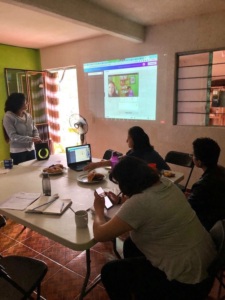 In addition, team members must adapt workshop curricula to meet the unique needs of each woman and community, varying based on factors such as participants’ ages, Indigenous languages spoken, and literacy levels. For example, Jazmín Manrique Vigueras, our field leader in the Tenango de Doria municipality, frequently translates presentations from Spanish into Otomí, an Indigenous language widely spoken in the area. In some cases, field members have to modify written material into images and videos to cater to participants who average a third-grade education with many being unable to read or write in Spanish. Adapting to local contexts is an important part of our strategy, but requires deliberate effort and thoughtfulness, prolonging the time needed to reach program goals.
In addition, team members must adapt workshop curricula to meet the unique needs of each woman and community, varying based on factors such as participants’ ages, Indigenous languages spoken, and literacy levels. For example, Jazmín Manrique Vigueras, our field leader in the Tenango de Doria municipality, frequently translates presentations from Spanish into Otomí, an Indigenous language widely spoken in the area. In some cases, field members have to modify written material into images and videos to cater to participants who average a third-grade education with many being unable to read or write in Spanish. Adapting to local contexts is an important part of our strategy, but requires deliberate effort and thoughtfulness, prolonging the time needed to reach program goals.
Program implementation can thus be challenging for our staff, but the same holds true for our women partners. The hours spent traveling is an opportunity cost that some women are just not willing to bear – besides weaving and attending workshops, most have to tend to the household as well. Furthermore, many of these communities lack reliable access to electricity, cell phone, and internet access, making it difficult to maintain contact with PSYDEH and their fellow cooperative members. These are some of the reasons identified by our field team for why, despite early program successes in attracting up to 75 unique women, consistent participation can be difficult to maintain. And without steady participation, the progress each cooperative can make is limited.
Yet, whilst these challenges may get in the way of achieving certain time-bound program goals, their very existence speaks to the necessity of the Sierra Madre Network program. These communities are underserved by mainstream public services and fall outside the bounds of public attention. It is important to reach out to and empower these women precisely because it is hard to reach them. Our task is difficult, but that is an inherent aspect of our community-led development work. Far from being discouraging, these challenges reaffirm the importance of PSYDEH’s ongoing mission – to confront inequality by investing in the ground-up empowerment of rural women who often find it difficult to access the education they need to sustainably support their own development.
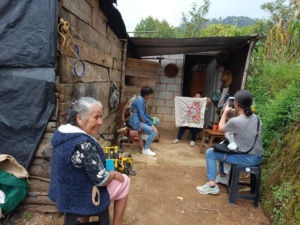 Crucially, these are goals that are not so readily measured by conventional metrics. Although output metrics like the amount of money earned per woman per month, or the total number of workshop participants give us useful insights on short-term impact, they do not capture the full nuance of the long-term, sustainable human development we hope to achieve. For instance, output metrics do not illustrate the full extent of the deep and generative relationships PSYDEH has built with these communities over the 15 years we’ve been working in the region. We consider these women our active partners and friends – not passive beneficiaries – who are wholly unique individuals with distinct hopes, concerns, backgrounds, and beliefs, and whose consistent participation in programming often follows only after they feel seen, heard, and valued over months and years.
Crucially, these are goals that are not so readily measured by conventional metrics. Although output metrics like the amount of money earned per woman per month, or the total number of workshop participants give us useful insights on short-term impact, they do not capture the full nuance of the long-term, sustainable human development we hope to achieve. For instance, output metrics do not illustrate the full extent of the deep and generative relationships PSYDEH has built with these communities over the 15 years we’ve been working in the region. We consider these women our active partners and friends – not passive beneficiaries – who are wholly unique individuals with distinct hopes, concerns, backgrounds, and beliefs, and whose consistent participation in programming often follows only after they feel seen, heard, and valued over months and years.
This understanding underpins our team’s approach to popular education at both a community and individual level. When reaching out to new communities, our team conducts preliminary “diagnosis meetings” to establish the context and foster personal connections. Individually, we know each cooperative member by name and take the time to learn their personal stories, their relationships with their husbands, and their personal motivations for joining the cooperatives. It is exactly this sense of being heard and cared for, of being invested in, that has compelled many local women to join our programs, the Sierra Madre Network or otherwise. In fact, many women partners who joined the Sierra Madre Network at its inception were participants from previous programs. This intimate rapport we have with the region’s women is not something easily reflected on a spreadsheet.
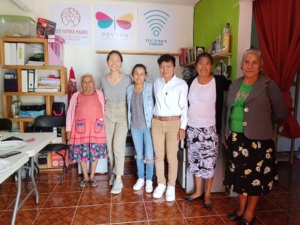 This is precisely why PSYDEH goes above and beyond when reporting to funders. Instead of simply providing obligatory output metric-oriented impact measurement assessments, we also encourage them to engage directly with our programs and to see for themselves the change they are creating. We invite external PSYDEH stakeholders to visit Hidalgo and catch our team in action. We have long-term collaborations with organizations and are transparent about our progress – for example, we have done over 20 update reports, such as this, for our longest-standing global partner, GlobalGiving, the world’s leading crowdfunding platform for nonprofits. In being active participants, our funders and partners not only gain a more holistic view of program success beyond conventional metrics but also understand that it takes time to see PSYDEH’s women partners drive their own truly sustainable, resilient, and human-centric change.
This is precisely why PSYDEH goes above and beyond when reporting to funders. Instead of simply providing obligatory output metric-oriented impact measurement assessments, we also encourage them to engage directly with our programs and to see for themselves the change they are creating. We invite external PSYDEH stakeholders to visit Hidalgo and catch our team in action. We have long-term collaborations with organizations and are transparent about our progress – for example, we have done over 20 update reports, such as this, for our longest-standing global partner, GlobalGiving, the world’s leading crowdfunding platform for nonprofits. In being active participants, our funders and partners not only gain a more holistic view of program success beyond conventional metrics but also understand that it takes time to see PSYDEH’s women partners drive their own truly sustainable, resilient, and human-centric change.
________________________________________________________________________________________________________
At the end of the day, what PSYDEH promises is to live by our values of “Communication”, “Responsibility”, and “Honesty”. We have set out clear and measurable goals using traditional logical frameworks to provide an accurate picture of our impact, and are on track to achieve them. However, part of being an organization of integrity is to accept that we operate in a complex world where many factors lie outside our control. Our duty to think “big” in the kinds of impact we want to co-create with local women must be matched by an equally important duty to have frank discussions when we fall short of targets by pre-determined deadlines, and then communicate what we plan to achieve based on new realities on the ground.
Our impact measurement and reporting journey has not been smooth, nor will it ever be. There is a reason why PSYDEH’s work is not often pursued – sustainable impact in long-term, human-centered developmental work is neither quickly achieved nor easily measured, but is necessary nonetheless. We hope our backers understand this and continue trusting us to move forward in the best interests of those partners we serve.
Author: Victoria Lim
Development Associate, PSYDEH
A look back at 2021…
PSYDEH increased individual and collective agency and solidarity by doubling down on multi-year field programming as well as resource diversification efforts.
COVID-19 & Climate change = Fieldwork Opportunities for Empowering Agency & Solidarity
The complicated, rural landscape in which we work grew more so in 2021. COVID-19 and climate change cut access to electricity and information and communications technology (ICT) as well as local mobility, all of which impacted PSYDEH’s work and economic life. Mexico saw the greatest increase in poverty across the Americas, with 65% of the population reporting less income.
 PSYDEH took any opportunity that these circumstances gave to us and worked in every way possible to continue our evolution as a paradigm changer in the field of community-led development. As we move into 2022, let’s look back at some of the highlights from this tough, productive year using six better practices for civil society to increase agency and solidarity as our guide. Source: Forthcoming research by Oxfam with support from London School of Economics AFSEE’s COVID-19 Rapid Response Fund.
PSYDEH took any opportunity that these circumstances gave to us and worked in every way possible to continue our evolution as a paradigm changer in the field of community-led development. As we move into 2022, let’s look back at some of the highlights from this tough, productive year using six better practices for civil society to increase agency and solidarity as our guide. Source: Forthcoming research by Oxfam with support from London School of Economics AFSEE’s COVID-19 Rapid Response Fund.
(1) Tackling misinformation and (2) offering emotional support
PSYDEH tactically used outcomes from multi-year programming ending in 2020 as the basis for a second multi-year program through 2024. Phase one began in March 2021 with goals like tackling misinformation and offering emotional support.
Information, and access to it, are vital to any sustained effort to navigate tough challenges like COVID-19. Starting early in the pandemic, PSYDEH translated and supplied science-backed information through our information series for rural communities. In 2021, we took the core of this learning and augmented it with new data when giving and inviting feedback from women and their communities on local needs.
Some of what we learned reinforced what we already knew; many Indigenous women feel isolated and abandoned, including by PSYDEH. This was painful to learn, and not surprising. Historically, funding constraints meant we offered only sporadic in-person consultation, and never individual personal coaching or psychological/legal consultations. This reality was compounded tenfold in 2020 when government lockdowns prohibited us from visiting women allies for much of the year.
Core mechanisms of 2021-2024 programming, therefore, include PSYDEH’s first-ever fieldwork hub we call Casa Siempre Viva (named after our regional collective ally), as well as a nine-person, majority-Indigenous women-led field corps. The Hub and field corps are long-missing pieces to our people-centric work. They decrease transportation costs (money and time) and are the tools through which we offer dignified, personal human contact and professional support, visibly demonstrating how seriously we take women’s demand for greater attention to their wellbeing.
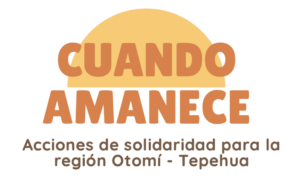 (3) Defending rights when, and through, (4) capacity building and (5) mutual-aid oriented direct services
(3) Defending rights when, and through, (4) capacity building and (5) mutual-aid oriented direct services
All PSYDEH efforts are human rights-oriented, e.g., holding the state accountable, filling gaps in state services, or normative advocacy, e.g., combat gender-based violence.
In 2021, we continue this tradition while evolving significantly the implementation of our rights-oriented scalable model explained in this Ted-Ed-inspired animation or this infographic. PSYDEH’s course correction was necessary because of the ongoing crises and how the Mexican government channels all funding to “el pueblo”, especially local economic projects, in lieu of supporting civil society organizations (CSOs).
 For example, we heeded local demands for “fish”, breaking from our tradition of only offering how-to-fish capacity-building workshops. 2021-2022 Cuando Amanece programming doubled down on our bet that women, when offered the right direct services, can and will improve their own living conditions in the short term, sowing the seeds for longer-term work. By year’s end, this programming and that which we celebrate below is prima facie evidence of how PSYDEH moved FROM rights-based, capacity-building support of women building their own CSOs TO the same but with a focus on women incubating their own small enterprises like poultry farming for egg production.
For example, we heeded local demands for “fish”, breaking from our tradition of only offering how-to-fish capacity-building workshops. 2021-2022 Cuando Amanece programming doubled down on our bet that women, when offered the right direct services, can and will improve their own living conditions in the short term, sowing the seeds for longer-term work. By year’s end, this programming and that which we celebrate below is prima facie evidence of how PSYDEH moved FROM rights-based, capacity-building support of women building their own CSOs TO the same but with a focus on women incubating their own small enterprises like poultry farming for egg production.
Other 2021 programming reflects this bet too. First, we embarked on our most professional social enterprise yet, what we call Bordamos Juntos. Built on 2020 success, this initiative spotlighted over fifty Indigenous women artisans from Hidalgo and their relationship to craft, while connecting them directly to an online e-commerce site hosted by our citizen group ally Ayuda Mutua CDMX, as well as PSYDEH’s Etsy store. Here, artisan allies receive a dignified wage for each piece sold and 100% of net income is reinvested into 2022 economic solidarity work.
Second, “the fish” delivered through Cuando Amanece and Bordamos Juntos  go to two different groups–a network of women-led organizations we’ve supported since 2014-2015 and a new one hailing from 20 more communities. These women are, by design, the ideal candidates for 2022-2024 work organizing what we call the Sierra Madre Network, women-led cooperatives that promote individual and collective agency, foster leadership and entrepreneurial skills, and activate more equal participation for women in their communities.
go to two different groups–a network of women-led organizations we’ve supported since 2014-2015 and a new one hailing from 20 more communities. These women are, by design, the ideal candidates for 2022-2024 work organizing what we call the Sierra Madre Network, women-led cooperatives that promote individual and collective agency, foster leadership and entrepreneurial skills, and activate more equal participation for women in their communities.
Lastly, PSYDEH engaged in two different normative advocacy activities. We linked political rights work with advocacy efforts by promoting women’s participation in Mexican electoral politics via our newest short film “Poderosa“. And we linked economic rights work with advocacy when consulting USA-based companies to generatively avoid the cultural appropriation of traditional Indigenous designs, including by helping artisans try to negotiate win-win alliances with brands.
(6) Support digital access

2021 crises reinforced what we have long known, and on which we have counseled global and national actors for some time: if we’re serious about increasing agency and solidarity among marginalized people, we need to be serious about helping them, and their civil society partners, to increase access to and adoption and use of ICT.
Thanks to our multi-layered partnership with Zoom, we inked a three-to-five-year partnership with USA-based Team4Tech to make a macro-and micro-level impact in this area through programming we call Tech Para Todos (Tech For All). at the global and national levels, we will innovate an ICT model for rural, sustainable development in the Global South. At the local level, we will boost programming and community coordination by linking a network of five rural digital work hubs with the outside world and providing culturally appropriate technology tools and training for all.
COVID-19 & Climate change = Staying the course towards resource stream diversification
With the year’s multiple crises and the Mexican government cuts of all funding, many Mexican nonprofits closed their doors. We knew that if we are to achieve ambitious programming goals, PSYDEH had to keep working on our resource stream diversification strategy, with a heavy focus on multi-year support. This strategy now has ten different streams, resulting in significant success, especially with corporate and global network investments of money and in-kind and professional services.
Growing our portfolio of global partnerships
 Corporate Alliances
Corporate Alliances
Corporate partnerships are an essential source of support. In 2021, we were selected for funding from Kroll advisory firm, Zoom company, and the giving arm of Germany-based Lemonaid & ChariTea. We received needed professional services investments from Zoom and multi-national companies like HSBC Bank and Johnson & Johnson. We produced our first fee-for-service socially conscious project with USA-based PopSockets. We also worked hard to maximize the benefits from in-kind donations of licenses and ad buys from Zoom and Google respectively.
Foreign governments and organizations
In the area of foreign government support, a long-time resource stream diversification goal, PSYDEH finally made a breakthrough when convincing the government of Ireland to invest in 2022 Sierra Madre Network programming.
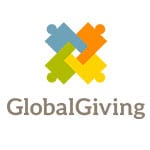 Building on our years-long partnership with USA-based crowdfunding platform GlobalGiving (GG), we followed up an especially strong year of fundraising in 2020 with our helping GG to launch their Ethos initiative and reorient their Annual Girl Fund to be more accessible to smaller organizations in the Global South in 2021. We also secured multiple partnerships in Germany with the aim to increase resource raising in this part of the world, including with the Maecenata foundation and the crowdfunding platform Betterplace offering a tax deduction to all Germans donating to PSYDEH.
Building on our years-long partnership with USA-based crowdfunding platform GlobalGiving (GG), we followed up an especially strong year of fundraising in 2020 with our helping GG to launch their Ethos initiative and reorient their Annual Girl Fund to be more accessible to smaller organizations in the Global South in 2021. We also secured multiple partnerships in Germany with the aim to increase resource raising in this part of the world, including with the Maecenata foundation and the crowdfunding platform Betterplace offering a tax deduction to all Germans donating to PSYDEH.
 Elsewhere, we joined new peer networks, including Red Impacto LATAM, USA-based Chacruna Institute’s Indigenous Reciprocity Initiative of the Americas, and UK-based Alliance of NGOs and CSOs for South-South Cooperation (ANCSSC). And we continued to benefit from existing partnerships like that which we have with the India-based social enterprise Chezuba through whom we were chosen as the only nonprofit in the Americas for the global multi-national company Tata Group’s pro engage employee volunteering program.
Elsewhere, we joined new peer networks, including Red Impacto LATAM, USA-based Chacruna Institute’s Indigenous Reciprocity Initiative of the Americas, and UK-based Alliance of NGOs and CSOs for South-South Cooperation (ANCSSC). And we continued to benefit from existing partnerships like that which we have with the India-based social enterprise Chezuba through whom we were chosen as the only nonprofit in the Americas for the global multi-national company Tata Group’s pro engage employee volunteering program.
Growing our team, story, and impact
In 2021, PSYDEH’s majority-women staff hailed from Argentina, Belgium, Brazil, Guatemala, Ireland, Mexico, Spain, Switzerland, the UK (Scotland), and the USA. Field team members cover program design and implementation, direct services, capacity building, and professional and personal development. For example, women like Nancy de Lucio Vargas, Citlali Aparacio Estrada, Jazmín Manrique Viguerez and Salma Sinaí Soto Montes lead the implementation of Cuando Amanece and Sierra Madre Network programming in 2021-2022.
PSYDEH’s backstop support office team leads resource raising, strategic partnerships and planning, professional volunteer recruitment via our new Global Collaborators Program, professional development, strategic partnership building, marketing, digital communications and optimization, and sustainability. For example, USA Uana Coccoloni, a marketing branding executive, donated her services to help us clarify our five value propositions. She then partnered PSYDEH with Brazilian graphic designer Patricia Priester on our beautiful new logo. These professionals from rural and urban Mexico and across the world, their extraordinary commitment, with all volunteering some or 100% of their time and most working virtually, make possible what we highlight in this article.
To stay updated with our news and progress during 2022, sign up for our monthly Co-op Report newsletter, and follow us on Facebook, Instagram, and LinkedIn.
PSYDEH’s First Ever Team Retreat
Starting strong in 2022
For the first time in the organization’s history, PSYDEH’s staff gathered together in Mexico City for a jam-packed three-day team retreat last month to empower the team as we launch our ambitious 2022 programming. Among a dynamic schedule packed with skills-focused training and team-building workshops, the team also welcomed guest Hanna Bruening from German-based funder Lemonaid & Charitea Foundation while unpacking the timeline, logistics, and objectives for phase one of our new women-led cooperative incubation program, Sierra Madre Network.

Strengthening team bonds
Long-distance colleagues were able to join in the fun via Zoom, participating in meetings with potential funders and corporate sponsors and even collaborating with content creator and internet celebrity Jonathan Kubben in a workshop dedicated to the power of storytelling.
In shared reflections on the retreat, team members commented that, “… it was a wonderful experience. I left with the feeling that the team is growing and forming really well”. Another shared, “I’m very inspired… to work with such empathetic leaders and create sustainable impact in the communities”, and yet another noted that they observed “…so much beautiful energy, enthusiasm, humor, space, and reciprocity” over the course of the retreat.
Besides a collective love for the team-building game “spiderweb” and Ryan’s homemade vegan tacos, one of the all-time favorite experiences for the team was getting to spend quality time with their fellow teammates. One team member shared, “I loved the breakfasts together (especially the pancakes!) and the deep feelings we all share for our work.” Another teammate reflected, “I’ve been stunned to work with such beautiful people over these last days. I never thought I would bond in these contexts. I am happy, I want to cry with joy. I just want to hug them all!”

Achieving retreat goals for sustainable impact
PSYDEH’s first in-person retreat in Mexico City brought together team members from near and far with three goals in mind. First, to create meaningful and impactful exchanges. Second, to hone professional skill development. Third, to produce strategic planning, tactics, and evaluation tools for our 2022 programming and produce sustainable impact. PSYDEH’s retreat created the perfect opportunity to achieve these three goals and more: aligning our growing team, practicing our shared PSYDEH values, and working together to ensure that every voice would be heard, honored and incorporated into our collective work in the year to come.
To stay up on all the latest PSYDEH news in 2022, subscribe to our Co-op Report Sierra Madre Network here.
Author: Hannah Swenson
PSYDEH Sustainability Coordinator
2021 Corporate Partner Win
Global healthcare company Johnson & Johnson (J&J Mexico), in collaboration with the Brazilian social business Phomenta, became our most recent corporate partner when they selected PSYDEH as one of 16 Mexican nonprofits to participate in their 2021 Corporate Social Acceleration Program (Marathon).
The Marathon program
Phomenta works with J&J Mexico to recruit multidisciplinary J&J professionals wanting to create social impact with nonprofit leaders through a seven-week program of weekly virtual work sessions. Their methodology is immersion-focused where the J&J team is empowered to deliver a feasible solution to a PSYDEH business challenge via a deep dive into our organization, including our business and fieldwork strategies and complicated 2022 challenges.

How we collaborated
Three PSYDEH leaders (Andrea Muñiz, Hannah Swenson, and Damon Taylor) worked directly with seven professionals spread across J&J Mexico offices (Ana Isabel Tellez, José Manuel González, Lesly Robles, Liliana López, Mateo Cruz, and Silvia Saucedo), and this team’s J&J Global mentor (Ruby Castilla). We were guided through the Marathon cycle by Phomenta workshop facilitator Isabel Davila with backstop support from Flávia D’Angelo.

The team chose to present a solution to this urgent business challenge: how does PSYDEH attract and retain mutually beneficial alliances with private companies in Mexico wanting to partner with us as an organization and our nascent network of cooperatives led by Indigenous women.
At the end of the Marathon, the J&J Mexico team (1) delivered to PSYDEH what they call their Story selling playbook, an eight-step road map we can use to attract Mexican companies seeking alliances with Mexican non-profits like us and the Indigenous women leaders of cooperatives we’ll incubate in 2022-2024. We also cement and now strengthen (2) strong relationships with our J&J Mexico peers, as well as with Phomenta, on whom we know we can count when trying to implement the proposed solution to our wicked business challenge.

As Isabel Davila, Phomenta representative and Marathon facilitator, shares: “The most powerful thing about PSYDEH’s work is its ability to help women discover their own value and abilities to transform their lives and that of their community. The ability to realize a vision of oneself as a woman and a shared vision about the potential of the community is a very difficult task, but one that if achieved, is what is truly transformative and clearly, PSYDEH is succeeding very effectively in transforming the life of the community.”
Our partnership produces needed outcomes
Today more than ever, where the pandemic and climate change disproportionately hurt rural areas in Mexico and across the Global South, and Mexican civil society confronts a hostile funding climate, it is crucial that the private and public sectors join forces to help companies win while they help non-profits and their beneficiaries like PSYDEH’s majority Indigenous women partners win, including and especially creating a sustainable social and economic impact that reflects local women and community demands.
A corporate partner like J&J Mexico is key to PSYDEH’s resource stream diversification strategy explained generally in this Spanish-language article. These partnerships, including those that involve in-kind donations of professional services, come in many sizes and forms. If managed well, they can make an important impact on all stakeholders’ lives, not to mention help us to build more just communities and sustainable futures.
As Mateo Cruz, J&J LATAM representative, shares: “I consider the involvement of the private sector in empowering the social projects that organizations like PSYDEH do to be very important. Social responsibility is now an expectation of our consumers and as private sector companies we must and want to play a more active role in closing social gaps and empowering marginalized communities; empowering them and giving them the tools to progress. As an employee of a private sector company, it is very enriching to be able to participate in these projects, to broaden our vision, to contribute our professional experience, our passion and resources to give a “push” to these communities that need it so much.”
See this case study to learn more about how we make a measurable impact with our corporate partner J&J Mexico.
About Johnson & Johnson Mexico

Johnson & Johnson is a U.S. multinational manufacturer of medical devices, pharmaceuticals, personal care, fragrances, and baby products founded in 1886 with a strong presence in Mexico and other countries around the world.
About Phomenta

Phomenta is a Brazilian social business that links education and innovative management strategies when helping business professionals to solve the most complex societal challenges through the diagnosis and certification of NGOs, social acceleration, and corporate social acceleration activities.
SELF-DETERMINATION IN THE AMERICAS
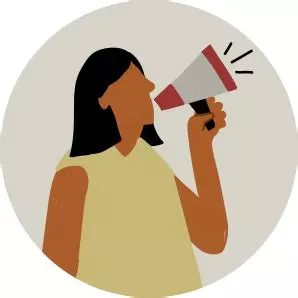 We are excited about another win in our work to collaborate with allies empowering self-determination across the Americas. The Chacruna Institute of Psychedelic Plant Medicines’ Indigenous Reciprocity Initiative of the Americas program (IRI) chooses PSYDEH as one of only four Mexican organizations for their network of 20 non-profits across the Americas.
We are excited about another win in our work to collaborate with allies empowering self-determination across the Americas. The Chacruna Institute of Psychedelic Plant Medicines’ Indigenous Reciprocity Initiative of the Americas program (IRI) chooses PSYDEH as one of only four Mexican organizations for their network of 20 non-profits across the Americas.
The IRI and Why We Value Being Selected
IRI’s goal is to build a grassroots support network that is offered educational resources while promoting organizations designed and implemented by and with local Indigenous people to address their own self-determined needs. Rather than imposing outside ideas of sustainability, they work directly with Indigenous leaders and small, non-profit coordinators who prioritize the autonomy of local people. All raised funds are distributed evenly among network members, discounting an administrative fee of 7.5% by the Chacruna Institute.
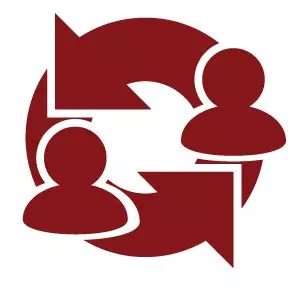 PSYDEH agreed to join the IRI network because we share a vision for empowering self-determination, we appreciate IRI’s equitably sharing funds without strings, and we are aligned with their use of the Quechua definition of reciprocity:
PSYDEH agreed to join the IRI network because we share a vision for empowering self-determination, we appreciate IRI’s equitably sharing funds without strings, and we are aligned with their use of the Quechua definition of reciprocity:
“Ayni,” the Quechua term for reciprocity, refers to a society existing in a constant state of flux, perpetually reordering and correcting for the dynamic imbalance of every living moment in pursuit of collective well-being.
As a network member, we can now use IRIs example when explaining to other partners how resources can be distributed in ways that lead to emergent agency or self-determination, for local communities and the organizations that serve them, a key to ground up, sustainable development. We also believe that our unique voice, made possible by our majority-women, Indigenous and non-Indigenous, cross-discipline, and multi-nationality team implementing our process-oriented model animated in action here might benefit the network.
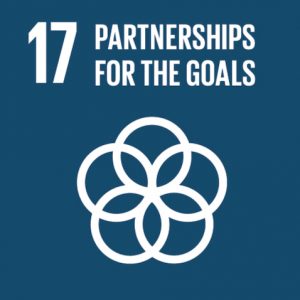 Collaborating with local organizations and communities to make sustainable progress
Collaborating with local organizations and communities to make sustainable progress
Practically speaking, it is not easy for rural, Indigenous community-focused organizations to network with the aim to make a sustainable impact, i.e., achieving the 2030 Sustainable Development Agenda Goal 17. We just don’t have the extra funds to send representatives to conferences at which we can share and learn. Moreover, in countries like Mexico, a scarcity-focused, short-cited mindset dominates, in comparison to a more generative abundance, forward-looking mindset. In our experience, therefore, the competition for ever more finite resources means it is difficult to forge sustainable impact-making collaborations. We hope that, in time, IRI can help its members to overcome these challenges.
Barriers to Mexican organizations finding new allies
For a local-focused Mexican nonprofit like PSYDEH, we struggle to create sufficient brand recognition and/or that platform from which we can give a voice to our work and local partners. While we’ve made recent big gains in the area of growing and promoting our brand, our voice is not yet known across the areas in which we work, let alone Mexico and the Americas. Thus, IRI’s interest in creatively bridging worlds–those serious about growing knowledge about plant medicines and psychedelics, those using them, and those working in the areas from which much of the plants come–is a real asset for non-profits wanting to share their story with wider audiences.
More on the Chacruna Institute of Psychedelic Plant Medicines 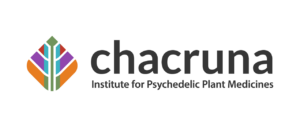
Founded by Brazilian anthropologist Dr. Bia Labate and American psychologist Dr. Clancy Cavnar, Chacruna (Spanish site) produces high-quality research on plant medicines and psychedelics and shares academic knowledge in accessible formats. They educate the public and create cultural understanding and legitimacy regarding these substances. They promote a bridge between the world of plant medicines and the emergent field of psychedelic science. They foster cultural and political reflections on the field of psychedelic science with the goal of increased informed discussion on these subjects. Finally, they use their platform to encourage intentional investment into Indigenous communities across the Americas.
 More on the IRI program
More on the IRI program
IRI was launched in April 2021 as a comprehensive online resource that allows people to connect with grassroots Indigenous community organizations at the local level. IRI’s work is centered on the concept of reciprocity toward the Indigenous groups to whom the psychedelic movement owes so much. Their goal is to decolonize philanthropy by creating a pool of funds that supports Indigenous initiatives with no strings attached—addressing everything from food security and environmental health to economic and educational support, cultural conservation, and more. IRI was born from working directly with Indigenous leaders and small, non-profit coordinators who prioritize the autonomy of local people. IRI consists of 20 organizations supporting 38 different Indigenous groups in multiple communities across Brazil, Colombia, Ecuador, Peru, Costa Rica, Mexico, and the United States.
Zoom, Team4Tech & PSYDEH

USA-based Zoom company has made a sustainable impact on PSYDEH thanks to our multi-phased, partnership since March 2021. Starting with a significant donation by Zoom’s Latinx employee resource group Somos in the 1st quarter in honor of International Women’s Day, our relationship deepened in the 2nd quarter thanks to a powerful interactive session hosted by Somos.
In the 3rd quarter, our alliance grew further with Zoom’s Head of Social Impact, Roxana Shirkhoda, inviting PSYDEH to participate in their Zoom Cares pro bono initiative, a part of which is facilitated by USA-based nonprofit Team4Tech (T4T).
What is the program
T4T facilitates Design for Impact Workshop (DIW) programming for corporate partners like Zoom interested in making a measurable social impact. These workshops link corporate professionals from sponsoring companies with non-profit leaders to solve a business challenge presented by the non-profit. T4T guides this public-private sector collaboration through their unique methodology based on Design Thinking, with their goal of producing actionable ideas to address the challenge.
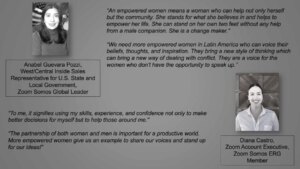 How we collaborated
How we collaborated
To garner interest among Zoom employees, PSYDEH hosted an information session with the full company about our work and the forthcoming workshop, offering an interactive experience with voices from PSYDEH’s staff and Zoom Somos Global Co-lead Anabel Guevara Pozzi, and Zoom Somos member, Diana Castro. It was well-received, with attendance remaining over 100 Zoom employees for the entire hour, and resulting in a team of twelve professionals signing up for our DIW.
Organized into three teams, these Zoom employees attended four DIW sessions at one and a half hours per day facilitated by T4T Program Director Chris Meehan. They were charged with presenting three different actionable ideas to address PSYDEH’s “How might we” challenge:
“How might we utilize technology to share PSYDEH’s stories and to promote the voices of Indigenous women in Hidalgo, Mexico?”
 Over these four days, PSYDEH served our Zoom friends by reminding them of three contextual points to consider when ideating solutions: (1) there is limited-to-no access, let alone use, of information and communications technology in the areas in which we work, (2) the organization operates on a shoe-string budget with limited to no flexible funding, and (3) Indigenous women partners have limited access to and awareness of internet-based platforms from which they can relay their voices.
Over these four days, PSYDEH served our Zoom friends by reminding them of three contextual points to consider when ideating solutions: (1) there is limited-to-no access, let alone use, of information and communications technology in the areas in which we work, (2) the organization operates on a shoe-string budget with limited to no flexible funding, and (3) Indigenous women partners have limited access to and awareness of internet-based platforms from which they can relay their voices.
As Katie Freund, PSYDEH strategic consultant states, “We wanted to present this challenge to Zoom because an internet-based platform that amplifies a women’s voice achieves two outcomes. First, it draws attention to a woman leader, creating a type of “social currency” (notoriety), that, second, allows her to better negotiate or renegotiate existing power structures. We went on to imagine with our Zoom friends how women can use a digital platform to reach local and state communities and governments, national company partners and government, and the global private and public marketplace.”
PSYDEH development officer and T4T-Zoom partnership lead, Ryan Lavigne, goes on to explain,
“We cannot be passive beneficiaries of Zoom’s significant investment. Their services and time are valuable. Because we all want the same thing–to make a measurable impact–PSYDEH staff who attended breakout sessions with the Zoom teams came up with four questions to occasionally raise with the aim of helping the teams to deliver actionable solutions:
(1) Does this solution facilitate the kind of information sharing that rebalances power for women partners?
(2) Does this solution involve a platform that increases the number of eyeballs on women’s work?
(3) How does the suggested platform amplify womens’ and PSYDEH’s voices such that the “person” at local, state, national, global levels cannot ignore these voices?
(4) Can and how can the suggested platform result in concrete measurable impact for women and PSYDEH?”
In the end, we were thrilled to receive three unique and actionable ideas we’ll pursue in the coming years.
Zoom then went above and beyond anything we’ve experienced with other corporate partners. With guidance from T4T, Zoom committed six DIW participants to invest work time over a subsequent 10-week period to implement the one actionable idea PSYDEH felt was most ripe for immediate use.
 Going above and beyond
Going above and beyond
PSYDEH opted for Team one’s actionable idea around how women can use a digital platform to break away from the “single story” narrative in which most are stuck, in part by communicating to the world who they are as individuals while promoting/selling their high-quality artisanal and local goods.
Zoom’s employees created an e-commerce website that will be folded into 2022-2024 programming to organize women artisan and producers leaders into a network of cooperatives we call Sierra Madre Network. The deliverable would have three interrelated elements focused on short-and medium-term impact: (1) structure for an interactive e-commerce website, (2) a website page with a business plan (and business research) for how women artisans and producers use this digital platform to tell their story to buyers in target countries, and (3) a cloud-based platform either part of the website or linked to the website with a visual manual, for example, a series of “how-to” videos on accessing/using the website and business plan for their sustained benefit.

Over the subsequent ten weeks, PSYDEH staff and the Zoom team met weekly, with T4T leadership supporting all via a separate workstream.
During the engagement, T4T and PSYDEH organized a special cultural session around the tradition of “Dia de Muertos” whereby PSYDEH staff shared how the local communities across the areas in which we work celebrate the tradition. We then collaboratively decorated a digital altar with the traditional Mexican goods used during the holiday as well as images of loved ones who are no longer with us.
This phase of our relationship concluded with a final meeting where Zoom presented and turned over their deliverables, while also expressing a strong desire to continue to support PSYDEH and women partners when implementing their ideas in 2022.
Our partnership produces an important impact
In 2022-2023, the website and related tools delivered by Zoom will be strategically integrated into our incubation phase of the cooperative building process. Women, with increased technology access and understanding thanks to our multi-year partnership with T4T, will learn about the website, how to use it, and how it can be an essential marketing and sales-making tool when paired with social media.
 In the medium-term of 2023-2024, the women’s cooperatives themselves will take full ownership of the website, using it as any vendor would. They will also benefit from the forward-looking strategic thinking tools already delivered by Zoom, e.g., how to construct a global network of allies promoting their work or how NFTs can be an income stream.
In the medium-term of 2023-2024, the women’s cooperatives themselves will take full ownership of the website, using it as any vendor would. They will also benefit from the forward-looking strategic thinking tools already delivered by Zoom, e.g., how to construct a global network of allies promoting their work or how NFTs can be an income stream.
Over the longer term, PSYDEH and our nascent network of Indigenous women cooperatives leave this engagement with a blue ribbon example of what is possible with global corporate and non-profit partners.
Who is Team4Tech
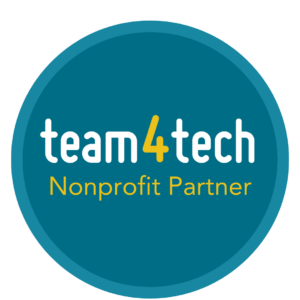 T4T is a US-based nonprofit advancing progress around United Nations Sustainable Development Goal 4.4 – “ensure inclusive and equitable education and promote lifelong learning opportunities for all”. They do this by partnering with global technology companies like Adobe, Cadence, HPE, Intel, and Zoom to build and implement social impact projects that provide ICT technology grants and training to nonprofit partners with the aim to build their capacities to better educate underserved learners.
T4T is a US-based nonprofit advancing progress around United Nations Sustainable Development Goal 4.4 – “ensure inclusive and equitable education and promote lifelong learning opportunities for all”. They do this by partnering with global technology companies like Adobe, Cadence, HPE, Intel, and Zoom to build and implement social impact projects that provide ICT technology grants and training to nonprofit partners with the aim to build their capacities to better educate underserved learners.
 Who is Zoom
Who is Zoom
This publically traded USA company helps its clients to express ideas, connect to others, and build toward a future limited only by imagination. Zoom is the only communications platform that started with video as its foundation, catering to large enterprises, small businesses, and individuals alike.
